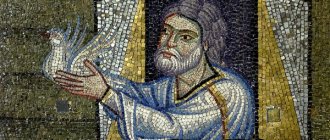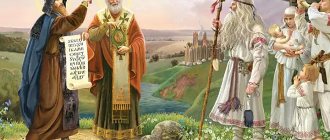Father of the Believers Abraham
He lifted up his eyes and looked, and behold, three men stood against him. When he saw it, he ran towards them from the entrance to his tent and bowed to the ground and said: Master! If I have found favor in Your sight, do not pass by Your servant
The earth was repopulated again, and wickedness again spread among people, and they began to forget God, they replaced the veneration of Him first with the veneration of the heavenly bodies, and then, descending lower and lower in spiritual understanding, they fell to gross idolatry.
But the same long-suffering Lord, “who does not want the death of the sinner,” is vigilant over his salvation, never departs from him, always abiding with those who remember Him, did not leave them in communication with them and through them supported faith in His covenant in other people, supported saving the spiritual life of humanity. Abram, the son of Terah, a descendant of Eber from the God-blessed family of Shem, was chosen as such an instrument of God, the greatest and most famous ancestor of the descendants from whom the Savior of the human race was to come. And the descendants of Abram were determined to prepare the ways of Him in Whom all the nations of the earth were to be blessed.
The faith of the Old Testament's chosen one of God, Abram, which in its strength was even imputed to him as righteousness, was revealed consistently in the following circumstances of his life: when idolatry and wickedness spread so widely that they threatened to completely drown out faith in the True God and thus interrupt the only connection of humanity with the Divine , then Abram alone retained that faith in the One invisible God, which replaced the Old Testament humanity with faith in God Incarnate, by which alone the New Testament people are saved.
And, seeing Abram’s faith, God chose him, and separated him from the tribe, and commanded him to go to a strange, unknown land, promising him to produce numerous descendants from him and to provide that blessed land as an inheritance to him. And the 75-year-old elder did not doubt what was announced to him, left his fatherland - the city of Ur (in Chaldea or Mesopotamia) and moved to the land of Canaan, indicated to him by God, with his wife Sarah and his nephew Lot. Here, surrounded on all sides by idolaters, he continued to keep his faith in the True God - and he himself was miraculously preserved by God, who “by faith obeyed the calling to go to the country that he had to receive as an inheritance, and went, not knowing where he was going. By faith he dwelt in the promised land as if it were a stranger, and lived in tents... for he looked for a city that has foundations, whose maker and builder is God.”
(Heb. 11:8-10)
From the book of Genesis it is known that when Abram moved to the land of Canaan, “Abram was very rich in cattle, and silver, and gold. And (his nephew) Lot, who walked with Abram, also had flocks and herds and tents. And the land was too big for them to live together, for their property was so great that they could not live together.”
“And there was a dispute between the herdmen of Abram’s cattle and between the herdmen of Lot’s cattle; and the Canaanites and the Perizzites lived then in that land. And Abram said to Lot, Let there be no strife between me and you, and between my herdsmen and your herdsmen, for we are relatives; Is not the whole earth before you? Separate yourself from me: if you go to the left, then I will go to the right; and if you go to the right, then I go to the left. Lot lifted up his eyes and saw the whole region of Jordan, that before the Lord destroyed Sodom and Gomorrah, all the way to Zoar, it was watered with water, like the garden of the Lord, like the land of Egypt; and Lot chose for himself all the region around the Jordan; and Lot moved towards the east. And they separated from each other.
Abram began to live in the land of Canaan; and Lot began to live in the cities around and pitched tents as far as Sodom.
The inhabitants of Sodom were evil and very sinful before the Lord.
And the Lord said to Abraham, after Lot had separated from him: lift up your eyes, and from the place where you are now, look to the north and to the south, and to the east and to the west; For all the land that you see will I give to you and to your descendants forever, and I will make your descendants like the sand of the earth; if anyone can count the sand of the earth, then your descendants will also be counted; Arise, walk through this land into the length and breadth of it, for I will give it to you (and to your descendants forever).
And Abram pitched his tent, and went and dwelt by the oak grove of Mamre, which is in Hebron; and he built an altar there to the Lord.”
(Genesis 13, 2, 5-18)
At this time, the king of Elam, Chedorlaomer, who had conquered the Jordan Valley and subjugated five local cities to his power, launched a war against the five kings of the regions he conquered, who refused to continue paying tribute to the winner.
Having united with other kings in the Valley of Siddim, the king of Elam put those who rebelled against him to flight. “In the valley of Siddim there were many tar pits. And the kings of Sodom and Gomorrah, taking flight, fell into them, and the rest fled into the mountains.”
“The victors took all the property of Sodom and Gomorrah and all their provisions and left. And they took Abram's nephew Lot, who lived in Sodom, and his property and left.
And one of the survivors came and informed Abram the Jew, who was then living near the oak grove of Mamre, and his allies, with whom Abram had already established friendly relations, since he enjoyed general respect. Abram, hearing that Lot, his kinsman, had been taken captive, “armed his servants who were born in his house, three hundred and eighteen, and pursued the enemies as far as Dan; and, dividing himself, he attacked them by night, he and his servants, and defeated them, and pursued them as far as Hobah, which is on the left side of Damascus; and he returned all the property and Lot his kinsman, and he returned his property, also the women and the people. When he was returning from the defeat of Chedorlaomer and the kings who were with him, the king of Sodom came out to meet him, and Melchizedek, king of Salem, brought out bread and wine - he was a priest of the Most High God - and blessed him, and said: Blessed is Abram of the Most High God , Lords of heaven and earth; and blessed be God Most High, who hath delivered thy enemies into thy hand. Abram gave him a tenth of everything.”
“And the king of Sodom said to Abram: Give me the people, and take the property for yourself. But Abram said to the king of Sodom: I lift up my hand to the Lord God Most High, the Lord of heaven and earth, that I will not even take a thread or a shoe strap from all yours, lest you say: I have made Abram rich; besides what the youths ate, and besides the share belonging to the people who walked with me.”
(Gen. 14, 10-24)
“After these things happened, the word of the Lord came to Abram in a vision at night, and it said: Do not be afraid, Abram; I am your shield; your reward will be very great. Abram said: Sovereign Lord! what will you give me? I remain childless; This Eliezer from Damascus is the steward of my house. Behold, You have not given me descendants, and behold, the man of my household is my heir.
And the word of the Lord came to him, and said, He shall not be your heir, but he who shall come out of your body shall be your heir. And he brought him out and said, Look at the sky and count the stars, if you can count them. And he said to him: You will have so many descendants. Abram believed the Lord, and He counted it to him as righteousness.
And he said to him: I am the Lord, who brought you out of Ur of the Chaldeans to give you this land for your possession. Know that your descendants will be strangers in a land that is not theirs, and they will enslave them, and they will oppress them for four hundred years, but I will bring judgment on the people to whom they will be enslaved; after this they will come out here with great property, and you will go to your fathers in peace and will be buried in a good old age; in the fourth generation they will return here.
On this day the Lord made a covenant with Abram, saying: To your descendants I give this land[1], from the river of Egypt to the great river, the river Euphrates.”
(Genesis 15, 1-7, 13-16, 18)
The promise of descendants to Abraham was not fulfilled for a long time; Abraham’s faith was tested for a long time, but he did not waver in it. And so, again the Lord visited Abraham. “And the Lord appeared to him at the oak grove of Mamre, as he sat at the entrance to (his) tent during the heat of the day.”
“He lifted up his eyes and looked, and behold, three men stood against him. When he saw it, he ran towards them from the entrance to his tent and bowed to the ground and said: Master! if I have found favor in Your sight, do not pass by Your servant; and they will bring some water and wash your feet; and rest under this tree, and I will bring bread, and you will strengthen your hearts; then go (on your way); as you pass by your servant.
They said: do as you say. And Abraham hurried to Sarah’s tent and said (to her): quickly knead three sati of the best flour and make unleavened bread.
And Abraham ran to the herd, and took a tender and good calf, and gave it to the lad, and he hastened to prepare it.
And he took the butter and the milk and the calf that had been prepared, and set it before them, while he stood beside them under the tree. And they ate. And they said to him, Where is Sarah your wife? He answered: here, in the tent.
And one of them said: I will be with you again at this time (next year), and Sarah your wife will have a son. And Sarah listened at the entrance to the tent, behind him. Abraham and Sarah were old and advanced in years. Sarah laughed inwardly, saying: Should I, when I am old, have this consolation? and my lord is old. And the Lord said to Abraham: Why did Sarah laugh (in herself)? Is there anything difficult for the Lord? At the appointed time I will be with you next year, and Sarah will have a son.
And those men arose and went from there to Sodom (and Gomorrah); Abraham went with them to see them off. And the Lord said: Shall I hide from Abraham (My servant) what I want to do?
From Abraham will surely come a great and strong nation, and in him all the nations of the earth will be blessed, for I chose him so that he would command his sons and his household after him to walk in the way of the Lord, doing righteousness and justice; and the Lord will fulfill on Abraham (all) that he spoke about him.
And the Lord said: The cry of Sodom and Gomorrah is great, and their sin is very heavy; I will go down and see whether they are doing exactly what the cry is against them, rising to Me, or not; I'll find out.
And the men turned from there and went to Sodom; Abraham still stood before the Lord. And Abraham came and said: Will You really destroy the righteous with the wicked (and the righteous will be as with the wicked)? maybe there are fifty righteous people in this city? Will You really destroy and not spare this whole place for the sake of the fifty righteous (if they are) in it? It cannot be that You would act in such a way that You would destroy the righteous with the wicked, so that the same thing would happen to the righteous as to the wicked; cannot be from You! Will the judge of all the earth act unjustly?
The Lord said: if I find fifty righteous people in the city of Sodom, then for their sake I will spare (the whole city and) this whole place.
Abraham said in response: Behold, I decided to say to the Master, I, dust and ashes: maybe there will be five missing to fifty righteous people, will you really destroy the whole city for the lack of five? He said: I will not destroy if I find forty-five there.
Abraham continued to talk to Him and said: Perhaps there will be forty there? He said: I will not do this even for the sake of forty.
And Abraham said: Let not the Lord be angry that I say: perhaps there will be thirty there? He said: I won’t do it if there are thirty there. Abraham said: Behold, I decided to tell the Lord: maybe there will be twenty there? He said: I will not destroy for the sake of twenty. Abraham said: May the Lord not be angry, what will I say one more time: maybe there will be ten there? He said: I will not destroy for the sake of ten.
And the Lord went away, ceasing to speak with Abraham; Abraham returned to his place."
(Gen. 18, 1-11, 13-14, 16-33)
Isn’t this amazing and touching conversation between a person and God a model of communication
souls with the One who created it? And not only is it accessible to every soul, but it constitutes its inalienable advantage, the highest gift of God. Isn’t this how, from century to century, pure, unspoiled souls talk with their Heavenly Father, calling on Him with the simplicity of children and always receiving a Divine response to their human appeal. If only they called! And the feedback will be heard and felt by the whole being of a sincerely believing soul.
The Lord will not remain silent before those who cry to Him. The evidence of this is countless in all the lives of the saints. And who in his life has not experienced in the most difficult moments how the Lord immediately responds to his prayer with beneficial suggestions, admonition and reassurance.
“And those two angels came to Sodom in the evening, while Lot was sitting at the gate of Sodom. Lot saw and stood up to meet them, and bowed down with his face to the ground and said: My lords! go into your servant's house and spend the night, and wash your feet, and rise in the morning and go on your way. But they said: no, we spend the night on the street.
He strongly begged them; and they went to him and came to his house. He made food for them and baked unleavened bread, and they ate.
(And) those men said to Lot: Who else do you have here? whether your son-in-law, your sons, or your daughters, and whoever you have in the city, bring everyone out of this place, for we will destroy this place, because the cry of its inhabitants to the Lord is great, and the Lord has sent us to destroy it.
When the dawn rose, the Angels began to hurry Lot, saying: Arise, take your wife and your two daughters that are with you, so that you do not perish for the iniquities of the city. And as he hesitated, those men (Angels), by the mercy of the Lord towards him, took him and his wife and his two daughters by the hand, and brought him out and placed him outside the city.
The sun rose over the earth, and Lot came to Zoar.
And Abraham arose early in the morning and went to the place where he stood before the Lord, and looked towards Sodom and Gomorrah and all the surrounding space and saw: behold, smoke rises from the earth like smoke from a furnace.
And it came to pass, when God was destroying (all) the cities around this region, that God remembered Abraham and sent Lot out from the midst of the destruction, when he overthrew the cities in which Lot lived.
And Lot went out from Zoar and began to live in the mountain, and his two daughters with him, for he was afraid to live in Zoar. And he lived in a cave, and with him were his two daughters.”
(Gen. 19, 1-3, 12, 13, 15, 16, 23, 27-30)
“Abraham went up from there to the south and settled between Kadesh and Shur.
And the Lord looked upon Sarah as he said; and the Lord did to Sarah as he had spoken. Sarah bore Abraham a son in his old age at the time about which God spoke to him; And Abraham called the name of his son who was born to him Isaac; And Abraham circumcised Isaac his son on the eighth day, as God commanded him. Abraham was a hundred years old when Isaac his son was born to him.
The child has grown up and is weaned; and Abraham made a great feast on the day that Isaac (his son) was weaned.”
(Gen. 20, 1; 21, 1-5, 
Meanwhile, Ishmael, the son of Abraham and Hagar the Egyptian, a former servant in the house, whom Abraham loved and cried out to God for him, so that he might live before the Lord, also grew up.
“God said to Abraham: And concerning Ishmael I have heard thee: behold, I will bless him, and will make him great, and will multiply him greatly, greatly; twelve princes will be born from him; and I will make him into a great nation. But I will establish my covenant with Isaac as an everlasting covenant, that I will be God to him and to his descendants after him.”
(Genesis 17, 18, 20-21, 19)
Meanwhile, the consequences of violating the unity of the marriage union, which had long been a custom in the times when Abraham lived, were revealed in this case also by family disagreement and discord.
“And Sarah saw that the son of Hagar the Egyptian was mocking her son Isaac, and she said to Abraham: Drive out this slave woman and her son, for the son of this slave woman will not inherit with my son Isaac. And this seemed very unpleasant to Abraham for the sake of his son Ishmael.
But God said to Abraham: Do not be upset for the sake of the boy and your handmaid; whatever Sarah says to you, obey her voice, for in Isaac your seed will be called. And from the son of the slave woman I will make a great nation, because he is your seed.
Abraham rose early in the morning, and took bread and a skin of water, and gave it to Hagar, placing it on her shoulders, and to the lad, and sent her away.
She went and got lost in the wilderness of Beersheba; and there was no water in the skin, and she left the boy under one bush and went and sat down at a distance, one shot from a bow. For she said: I don’t want to see the boy die. And she sat down at a distance opposite him, and raised a cry and wept.
And God heard the voice of the lad from where he was; and the Angel of God from heaven called to Hagar, and said to her: What is the matter with you, Hagar? don't be afraid; God heard the voice of the boy from where he is; Arise, lift up the lad and take him by the hand, for I will make him into a great nation. And God opened her eyes, and she saw a well of living water, and she went and filled a bottle with water and gave the boy a drink. And God was with the boy; and he grew up and began to live in the desert, and became an archer.
He lived in the desert of Paran; and his mother took him a wife out of the land of Egypt.”
(Genesis 21:9-21)
The strongest of all people in faith faced the most difficult test, the only one from the beginning to the end of the existence of people on earth...
When Abraham's heir, the son Isaac, was born, and he grew up, and the heart of the father rejoiced, seeing in his son a vessel of promises and Divine blessings from generation to generation, then the Lord tempted the faithfulness of His servant with the last test. God said to Abraham: “Take your son, your only son, whom you love, Isaac; and go to the land of Moriah and there offer him as a burnt offering on one of the mountains about which I will tell you.”
“Abraham rose early in the morning, saddled his donkey, and took with him two of his servants and Isaac his son; He chopped wood for the burnt offering, and got up and went to the place that God had told him about.
On the third day Abraham lifted up his eyes and saw the place from afar. And Abraham said to his youths: Stay here with the donkey, and I and my son will go there and worship, and return to you. And Abraham took the wood of the burnt offering, and laid it on Isaac his son; He took the fire and the knife in his hands, and they both went together. And Isaac began to speak to Abraham his father, and said: My father! He answered: Here I am, my son. He said, “Here is the fire and the wood; where is the lamb for the burnt offering?” Abraham said: God will provide for Himself a lamb for a burnt offering, my son. And they both walked on together. And they came to the place that God had told Abraham about; And Abraham built an altar there, laid out the wood, and, having bound his son Isaac, he laid him on the altar on top of the wood. And Abraham stretched out his hand and took a knife to kill his son.
But the Angel of the Lord called to him from heaven and said: Abraham! Abraham! He said: here I am. The angel said: Do not raise your hand against the boy and do not do anything to him, for now I know that you fear God and have not withheld your son, your only son, for Me.
And Abraham lifted up his eyes and saw: and behold, behind him was a ram caught in a thicket by his horns. Abraham went and took the ram and offered it as a burnt offering in place of Isaac his son.
And the Angel of the Lord called to Abraham a second time from heaven and said: I swear by Me, says the Lord, that because you have done this deed, and have not withheld your son, your only son for Me, I will bless you in blessing and multiply I will multiply your seed as the stars of heaven and like sand on the seashore; and your seed shall take possession of the cities of their enemies; and through your seed all the nations of the earth will be blessed, because you have obeyed my voice. And Abraham returned to his servants, and they arose and went together to Beersheba; and Abraham dwelt in Beersheba.”
(Gen. 22, 15-19)
God loved Abraham for love, piety, fear of God and obedience. He chose righteous Abraham to preserve the true faith through his descendants for all mankind. “I will make you into a great nation,” God told Abraham. (Genesis 12:2)
In this people, in time, the promised Savior of the world will be born, who will bless all nations. And just as the Old Testament prophets Moses and David called Abraham to intercede before God, so the New Testament Church calls on God for mercy for the sake of His beloved forefather Abraham. Jesus Christ Himself, in His parable of the rich man and Lazarus, points to Abraham as the inhabitant of a blessed dwelling in His Heavenly Kingdom (see Luke 16:19-31).
[1] At the conclusion of His covenant with Abram, the Lord also said to him: “And you will no longer be called Abram, but your name will be Abraham, for I will make you the father of many nations; and do not call Sarah your wife Sarah, but let her name be Sarah; I will bless her and give you a son by her; I will bless her, and nations will come from her, and kings of nations will come from her” (Gen. 17:5, 15-16).
Abraham and the Three Angels - Bartolome Esteban Murillo
Description of the work
The mysterious appearance of the Lord in the form of Three Angels to the forefather Abraham is described in the eighteenth chapter of the book of Genesis. “And the Lord appeared to him at the oak grove of Mamre, as he sat at the entrance to [his] tent during the heat of the day. He lifted up his eyes and looked, and behold, three men stood against him. When he saw it, he ran towards them from the entrance to [his] tent and bowed to the ground.”
(Gen. 18:1-2).
Following the traditions of hospitality, Abraham washed the feet of the travelers and offered a treat of milk, bread, meat and butter. The pious soul of Abraham recognized the presence of God among the guests, and he gave them due worship. Along with the revelation of the birth of a son to Sarah, those who came repeated the blessing to the patriarch: “Abraham will surely make a great and strong nation, and in him all the nations of the earth will be blessed, for I have chosen him so that he will command his sons and his household after him, walk in the way of the Lord, doing righteousness and justice;
and the Lord will perform on Abraham [all] that he has spoken about him” (Gen. 18:18-19). In his painting, Murillo showed the patriarch kneeling. The gesture of tired hands invites travelers to rest and accept the hospitality of the host. Abraham wears modest black clothing and a white turban, as white as the hair of his long beard. Behind the patriarch’s back, the artist depicted a tall tree with a dense crown and a building with a small window. The three Angels who visited Abraham are shown as three young men with similar facial features and a hairstyle of wavy brown hair that goes down to their shoulders. In their hand, each of Them holds a golden staff with a twisted knob. Murillo did not write the usual wings in this case behind the backs of those who came. The composition is constructed in such a way that the three Angels look like one. This image allegorically conveys the dogma of the One Trinity God in Persons.
History of creation
The painting "Abraham and the Three Angels" was painted by Esteban Murillo between 1670 and 1674. Several years ago, the artist experienced a personal tragedy that influenced both his future life and his work. After a long break, Murillo’s painting acquired a new quality, the figures on the canvases ceased to be sharp, their softened silhouettes began to be enveloped in a gentle pastel haze. A recognizable “airy style” of Murillo has emerged, which can be seen in the presented painting “Abraham and the Three Angels.”
The author's attitude towards faith
Bartolome Esteban Murillo, the future leading painter of Spain's Golden Age and head of the Seville school, was born into a Catholic family and baptized in a Catholic church. No documentary evidence has been preserved about the first decades of his life, but from further actions it becomes clear that Esteban was brought up on Christian values, which he accepted with all his soul. According to contemporaries, Murillo was a calm, gentle and friendly person. Neither early orphanhood, nor the loss of his firstborn and the death of his wife hardened him, but, on the contrary, strengthened his faith and multiplied his good deeds. It is known that after losing his beloved wife, the artist began to pay more attention to charity. His attention and love for ordinary people, their lives and problems was reflected in the portraits of children and the disadvantaged. When Murillo's popularity as a religious painter subsided over time, the children's portraits he created, in which the truth of life was tightly intertwined with optimism, retained their undeniable artistic value. Murillo wrote mainly on religious topics, which could be explained by the demand of a religiously minded environment, but the diligence with which the work was completed and the personal attitude towards the biblical subjects depicted indicate the opposite. Murillo painted the image of the Virgin Mary many times, developing his own iconography of the Immaculate Conception. In the continuation of his creative life, he painted about twenty paintings with this plot, which became extremely popular in Europe. The artist collaborated with local churches and the monastic order, and there was not a single significant cathedral in Seville that did not contain the artist’s works. In 1658, Murillo was elected the best artist of the city by the church council of Seville Cathedral. The works that brought the first fame were written by the master for the monastery; Likewise, the last labors, interrupted by death, were performed for the monastic community. This is seen not only as symbolic, but also in accordance with the words of the Lord: «
What I find in that is what I judge.”
Biography
History has not preserved the date of birth of Bartolome Esteban Murillo; it is only known that he was baptized in one of the churches of Seville on January 1, 1618. The boy was orphaned early and was raised by wealthy relatives, but little is known about his childhood and adolescence. The reasons why the artist chose to take the surname of his mother Murillo are also unclear, but this fact is confirmed by documents. Relatives took care of the boy and early noticed his ability to paint. It is believed that Bartolomé Esteban's first teacher was the then famous Baroque master Juan del Castillo. However, in 1639, the teacher left the city in search of work, and the young artist had to work alone. Murillo painted paintings on religious subjects and sold his works at a local fair. There is an assumption that in 1640 the painter moved to Madrid, where, under the patronage of his fellow countryman Diego Velazquez, he gained access to the royal art reserves and was able to study by making copies of the works of the great Italian and northern masters. Two years later, one of the most famous Franciscan monasteries ordered Murillo 11 giant (from 2 to 5 meters) compositions. This work took about three years and upon completion immediately made Murillo famous. Already in Murillo's early works one can sense a natural storyteller. This will become his method - not just to write a gospel scene according to the canons, but to fill it with living details, stories of the characters’ relationships, and everyday details. Two main themes glorified the artist - portraits of the dispossessed and images of the Virgin Mary in glory.
In 1645, Murillo married Doña Beatriz Sotomayor y Cabrera. Five children were born to this marriage. The eldest daughter died at the age of four during a plague epidemic and the artist grieved this loss. In 1660, Esteban Murillo took pride of place as one of the directors of the newly founded Academy of Painting in Seville and headed it for four years. The pinnacle of the master’s career was the offer to take the position of court artist instead of the deceased Velazquez. But he refused tempting prospects and preferred a calm and prosperous life in his hometown. The death of his wife during childbirth in 1664 greatly influenced the artist’s character. After this, Murillo moved from the mansion to a small annex at the La Caridad hospital, owned by the Capuchin brotherhood, closed himself off and wrote nothing for several years, and distributed most of his huge income to the poor. After the crisis, his work acquired a new quality - the so-called “airy style” of Murillo emerged. The figures on the canvases ceased to be sharp and harsh; their softened silhouettes began to be enveloped in a gentle pastel haze. The master only once agreed to leave his hometown for a long time, and this decision had fatal consequences. In 1682, he took an order to paint the Capuchin monastery and left for Cadiz. The work was carried out on scaffolding, from which he inadvertently fell. Seriously injured Esteban Murillo was brought to Seville, but he never recovered from the consequences of the fall and died on April 3, 1682. The artist’s work was continued by numerous students and followers, and his work had a significant influence on the subsequent development of national painting.
Author of the text: Olga Severinova.







